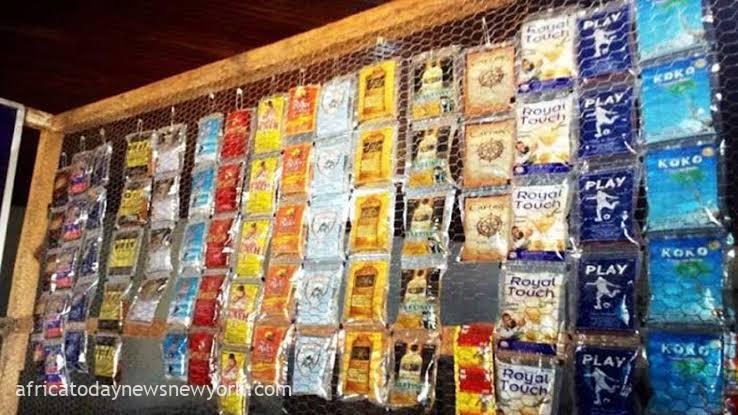The Manufacturers Association of Nigeria (MAN) has voiced apprehension over the recent prohibition on spirit drinks packaged in sachets and PET bottles less than 200ml.
MAN has urged for an immediate reversal of the ban, advocating instead for the implementation of regulations and enhanced access controls.
According to MAN’s Director-General, Segun Ajayi-Kadir, he highlighted that upon the initial proposition of the ban by NAFDAC, pivotal figures within the Distillers and Blenders Association of Nigeria (DIBAN) expressed reservations in a letter dated 6/11/2018.
MAN reported that DIBAN contested NAFDAC’s claim, stating that linking the rise in underage alcohol consumption to packaging in sachets and PET bottles is baseless. DIBAN argued that this reflects a more extensive systemic issue.
The manufacturers defended their position, stating that the assertion of a connection between the alleged increase in hard drug use and alcoholic drinks in sachets and small PET bottles is inaccurate. They emphasized that this has never been the reason for irresponsible consumption in terms of quantity, intoxication, and other related issues.
The Director-General pointed out the looming consequences, stating that the ban could result in bootlegging, a surge in fake and adulterated products, and harm to local manufacturing, adversely impacting the economy and the social wellbeing of the people.
Acknowledging their prior reservations, DIBAN, as he explained, participated in the formulation of a Memorandum of Understanding (MOU). This agreement, signed on December 18, 2018, included the Federal Ministry of Health, NAFDAC, CPC (now FCCPC), the Association of Food, Beverages, and Tobacco Employers (AFBTE), and DIBAN, all with reservations.
Ajayi-Kadir highlighted that after the MoU signing, DIBAN initiated an extensive array of activities, encompassing advocacy, messaging, training, education, and other responsibilities assigned to the formed Committee. Exceeding N1 billion in expenditure, multiple campaigns were launched to eradicate underage alcohol consumption and promote responsible use among adults.
He emphasized that the committee established a strategic plan for collaborative efforts at all levels to eliminate underage drinking, encourage responsibility among adults, and safeguard the growth of local industries.
‘The plan was drawn up to identify factors that affect irresponsible consumption of alcoholic beverages; factors responsible for underage drinking, implement strategies guided by best global practices and national priorities towards strengthening regulatory activities; strengthen implementation structures through effective collaboration to ensure sustainability and generate evidence through effective monitoring and evaluation for learning and accountability.’
‘Some of the key activities included harmonising all relevant alcohol and alcohol consumption related laws and regulations, improving regulation of registered alcoholic beverages and imported alcoholic beverages including spirits, shut down unregistered alcoholic beverage factories and warehouses as well as monitoring advocacy, sensitisation campaigns and regulatory/committee activities.’
Read also: Why More Manufacturers Could Leave Nigeria After P&G – MAN
‘We all agreed that there should be collaborative efforts to eliminate underage drinking or use of alcoholic beverages; better regulations backed by informed policy and not a general ban on the production and sales of drinks in sachet and PET bottles and the sale of alcoholic beverages should be restricted to On- and Off-license shops and ALGON should be strengthened to oversee the process. We also agreed that there should be government support to promote and protect the growth of local industries and jobs through the balance of trade, tackling of fake, counterfeit, and unwholesome alcoholic beverages and strict monitoring and evaluation of efforts by all member organisations of the committee.’
‘To our greatest surprise, we realised the apparent preoccupation of NAFDAC to ban the production of drinks in sachets and PET bottles this year. This is at variance with the right of private entrepreneurs to invest and engage in legitimate business. Besides, the proposed policy would amount to a deliberate destruction of the business of local and indigenous investors who through thick and thin, have kept faith with the Nigerian economy.’
‘We have continued to invest and reinvest at enormous cost in this economy and in the Nigerian people who are the bulk of its nearly Five Hundred thousand people workforce. This is despite the daunting challenges that businesses have faced in these difficult times, which have led to several companies closing down and foreign investors leaving the country. If this administration is committed to encouraging and strengthening local investors, then this ban should give way to access control.’
He added that the sachets help with portion control compared to big bottles. ‘If you take away small sizes, you are encouraging excessive consumption of alcohol. To go ahead with the policy based on perceived danger, without empirical information and not minding the consequences is unfair to industry operators and the thousands that will lose their jobs in these hard times.’
The DG urged the Federal Government to instead, intensify activities and support access control and tighter regulations, stressing that the ban will be counterproductive. ‘The ban should be reversed immediately and replaced with licensed liquor stores/outlets across the country; suspected underage persons should be required to show I.D to purchase alcohol and better enforcement by law enforcement agencies.’
‘There should also be Increased monitoring and compliance checks by NAFDAC, FCCPC and others to ensure strict product quality in terms of content and safety,’ he said.

